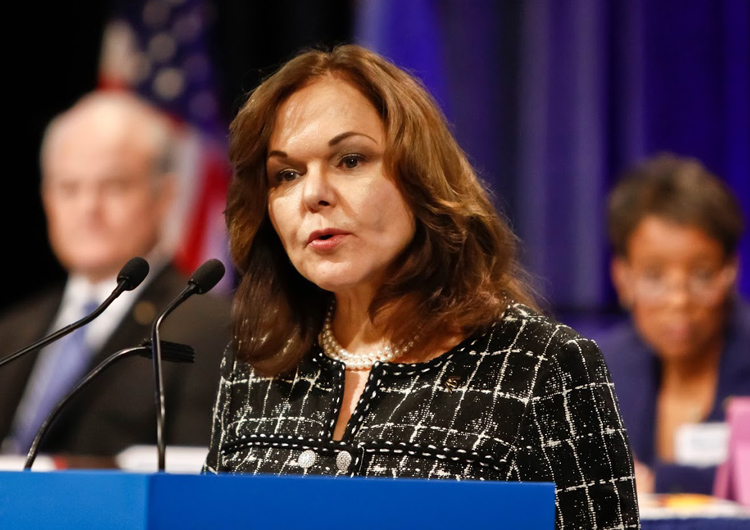ABA president will visit Texas-Mexico border to assess how America’s lawyers can help

ABA President Hilarie Bass. ABA Journal file photo by the Canadian Press Images/Michael Desjardins.
Updated: ABA President Hilarie Bass will visit the Rio Grande Valley of Texas on June 25-26 in response to widespread concern about the federal policy of separating families at the U.S.-Mexican border.
“The separation and detention of innocent children is antithetical to our values as Americans,” Bass said in a press release. “I will go to Texas to assess the situation and investigate ways the legal community can help expedite the reunification of families, assist in finding pro bono attorneys for those seeking asylum, and ease the stress and suffering of all individuals seeking entry into the United States.”
Bass is scheduled to visit Harlingen, Texas, where the ABA’s asylum project, the South Texas Pro Bono Asylum Representation Project, is based. She is planning to speak with parents at the Port Isabel Detention Center about their legal needs; observe court proceedings; and meet with ProBAR staff and other local attorneys.
The nation’s attention has turned in the past week to the separations of immigrant families at the border. The separations are a result of the Department of Justice’s “zero tolerance” policy for people who cross the border illegally, which in May called for federal authorities to prosecute “as many of these cases as humanly possible” for misdemeanor illegal entry. Media reports estimate that more than 2,000 children have been separated from their parents under this policy. The ABA has already put together a resource page aimed at attorneys who want to do pro bono work, donate or otherwise help.
After widespread, bipartisan condemnation—including a May 30 statement calling the policy “unnecessarily cruel” and a June 12 letter from Bass to federal authorities—President Donald Trump yesterday signed an executive order stopping the family separations. Bass hailed this as a “first step.” Customs and Border Protection said Thursday that it would stop referring the adults for illegal entry prosecutions until ICE could find enough space to hold the families together pending a deportation case.
However, the executive order calls for families to be detained together, which Bass stressed that the ABA opposes in most cases. That policy is likely to face a legal fight. The executive order instructs the Justice Department to ask a court to reopen the 1997 settlement in Flores v. Reno, a long-running lawsuit whose settlement governs the rights of minors in immigration custody. In 2015, U.S. District Judge Dolly Gee of the Central District of California ruled that under Flores, the settlement applies to children accompanied by adults, which means the federal government may not detain children with their parents in prison-like settings.
It’s unclear why Gee would want to reverse herself, as Mother Jones noted yesterday. The plaintiffs’ attorneys, a mixture of immigrant, child and human rights advocates, are also likely to oppose such a request.
The case is currently open to address unrelated issues: the alleged unlawful drugging of unaccompanied minors in federal custody, and an alleged practice of putting those minors in more secure custody than necessary.
Federal officials say families are being separated because the parents broke the law, requiring authorities to take their children away so they can be prosecuted. However, ABA ProBAR director Kimi Jackson and federal defender for the Southern District of Texas both told the ABA Journal this week that the adults who plead guilty—the vast majority—typically get “time served” for the two days or so they spent in Customs and Border Protection holding cells.The adults are then sent into Immigration and Customs Enforcement detention to await deportation, Jackson says, and have a deportation case filed against them just like the separate ones for their children.
“There’s no reason that they need to be separated from their children,” says Jackson. “They’re not sent to any kind of a federal prison or jail.”
Jackson also noted that CBP officers have been standing on the U.S. side of the international border, turning asylum-seekers away—therefore making it impossible for them to claim asylum through the federal government’s own process. Families turned back into a dangerous part of Mexico then often try to cross illegally, she says, which triggers the prosecutions.
Updated June 22 with additional details about Bass’ plans.



